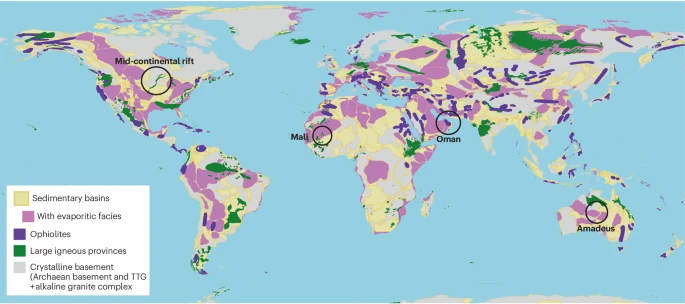Unlocking Earth's Natural Hydrogen Reserves: A Game-Changer for Low-Carbon Energy
Key Ideas
- Scientists uncover evidence of vast natural hydrogen reserves in Earth's crust, equivalent to 170,000 years of global oil consumption, detailed in a Nature Reviews Earth & Environment study.
- Two primary mechanisms of natural hydrogen formation identified: water-rock reactions in iron-rich rocks and radiolysis from radioactive elements, operating over different timescales.
- Four geological settings with hydrogen potential defined, suggesting global accessibility of natural hydrogen as a low-carbon and economically viable energy resource.
- Challenges include preserving hydrogen over time, potential mixing with other gases, and the need for further research on extraction techniques and understanding hydrogen generation rates.
A recent study published in Nature Reviews Earth & Environment reveals the potential of natural hydrogen gas reserves trapped deep within Earth's continental crust as a vast, low-carbon energy resource that could revolutionize the global energy transition. Authored by researchers from the University of Oxford, the University of Toronto, and Durham University, the study discusses how hydrogen accumulates through water-rock reactions and radiolysis processes over geological time. This natural hydrogen, unlike manufactured hydrogen, offers minimal carbon footprint benefits. The study identifies four geological settings where natural hydrogen could be extracted economically, showcasing its global accessibility.
The discovery of the Bourakebougou gas field in Mali in 2018 brought attention to commercial potential, highlighting the challenges of preserving hydrogen over time and its unique extraction requirements. Although not renewable, natural hydrogen presents a sustainable option with an estimated production cost of $0.50-1.00 per kilogram, making it more cost-effective than green or blue hydrogen. However, significant knowledge gaps persist, necessitating further research on extraction methods, estimation of trapped hydrogen quantities, and the potential mixing of hydrogen with other gases.
While natural hydrogen holds promise as a low-carbon energy source, its widespread extraction poses challenges and uncertainties, particularly in assessing the purity and availability of hydrogen deposits. The study emphasizes the need for additional exploration and advancements in technology to harness the full potential of Earth's natural hydrogen reservoirs for a sustainable energy future.
Topics
Production
Energy Transition
Economic Viability
Hydrogen Production
Geological Formations
Knowledge Gaps
Global Accessibility
Latest News
